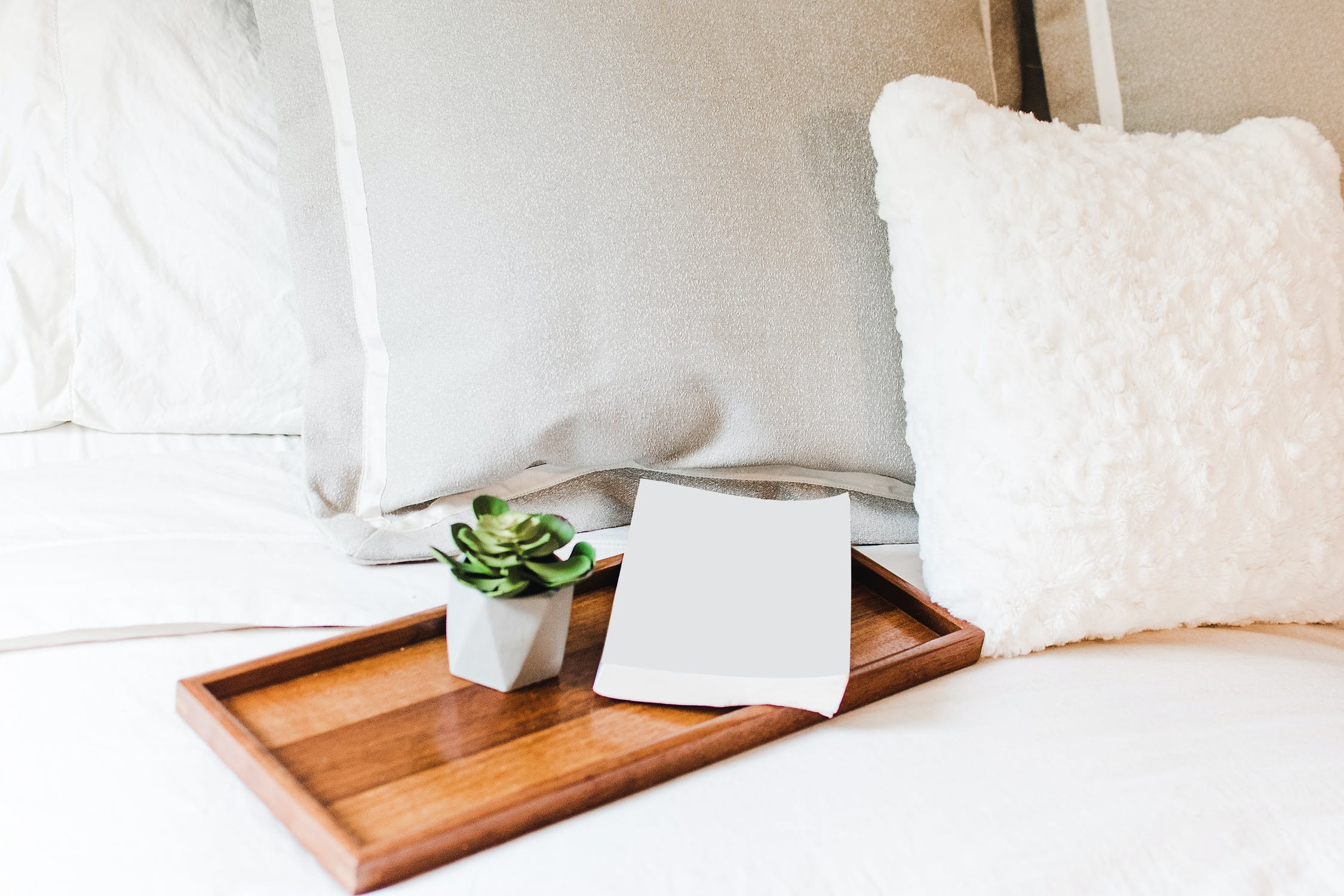Bedding often comes with detailed information on thread counts and washing instructions. However, the labels typically neglect to say how often bed sheets should be changed. In this article, we’ll answer the common question of how often should you change your duvet cover, and share tips to keep your bedding fresh and inviting.
Fresh bedding is important to get the best night’s sleep possible. So, how often should you change your sheets?
Why change bed sheets?

Regularly changing bedding might feel a little like a chore, but it’s important to get into a habit of rotating with clean bed sheets. But why?
We’ve highlighted the four key reasons to clean your dirty bed sheets, including the ways you can improve evening hygiene and enjoy a more comfortable night’s sleep.
Prevent a build-up of grime
Bed sheets can get very dirty, very quickly. A lot quicker than most people realise. After a few days of use, bed sheets accumulate dead skin cells, oil from your skin and hair, saliva, sweat and even small amounts of urine and faecal matter.
It turns out, the human body leaves a trail of grime behind it, and our bed sheets catch it all. If left long enough, bedding can become so unsanitary that simply sleeping with a cut or wound can lead to an infection.
Reduce exposure to harmful bacteria
Lengthy periods of time between changing bed sheets can increase exposure to various fungi and bacteria. Their presence isn’t guaranteed to cause illness, but they can be very bad for health and even lead to various diseases.
Stop dust mites in their tracks
One major problem with used and unchanged bed sheets is the build-up of dead skin cells. You may not notice as skin cells shed and settle on your bed sheets, but it creates a perfect environment for dust mites to thrive.
Dust mites are tiny, 8-legged creatures that are invisible to the naked eye. They love to live on bed sheets and feast on the dead skin they find there. Even a small amount of dead skin cells can feed millions of dust mites.
Dust mites don’t bite. However, they aren’t exactly the best bedfellows, as their faeces are a common allergen. Their presence can badly affect people with asthma and can cause symptoms of hay fever, eczema, skin irritation and coughing - even in people without any serious allergies.
Maintain a luxurious sleeping environment
Changing bed sheets isn’t only about avoiding the negative consequences; there are also many benefits to rotating your sheets. In fact, there are few feelings as good as slipping into a bed with crisp, freshly changed sheets.
The peace of mind that comes from being surrounded by the fresh scent of new sheets when sleeping could even be considered luxurious.
What if you don’t wash sheets regularly?
We’ve talked about the importance of changing your sheets regularly, but it’s important to stress just how crucial it is to wash your bedding each week!
Bacteria and pollen build-up on your bedding can quickly trigger allergic episodes, including asthma or skin conditions like eczema and dermatitis. And if you’re already a sufferer, dirty bed sheets can worsen your symptoms significantly. Importantly, if you fail to clean your bedding, you also run the risk of contracting or worsening infections.
How often should you change your bed sheets?
Chances are that most people aren’t changing their bedding as often as they should be. But exactly how often should you wash your sheets? Well, the general rule is that used bedding should be changed about once a week.
Some people could probably get away with changing sweaty bed sheets once a fortnight, if conditions are absolutely perfect, however there are many variables that make a once a week bedding change absolutely necessary.
Each bed should have at least two sets of bedding available for use, so that when one set of bedding is being washed, another is on hand to take its place. This is to avoid sleeping on a bare mattress without any sheets.
Any amount of time sleeping on a mattress without can have some unsavoury consequences; the mattress will absorb all the oils, dead skin cells, germs and dust that bed sheets normally would.
However, washing mattresses is not as easy as changing sheets, and the grime will stay and accumulate, which can lead to increases in bacteria, fungi, fabric discolorations and unpleasant smells. So, make sure you have spare sheets!
What factors warrant more frequent washing?
In some cases, washing your bedding once a week won’t quite cut it, and you’ll need to rotate your sheets even more frequently. We’ve picked out six common reasons you might need to wash your bedding more often.
1. You’re a sweaty sleeper
Night time sweating can cause a huge build-up of bacteria on your bedding, which can lead to skin irritation and an uncomfortable night’s sleep. Dirt that builds up on your pillows through sweat and oils can also quickly clog your pores and cause spots to show on your face.
2. You share the bed with a partner
Sharing a bed with someone else means twice the amount of dirt, grime, and sweat that builds up on your bedding, so it’s important to wash your sheets even more frequently.
3. You have persistent allergies
Your bedding can quickly become littered with allergens, including dust, mites, and pollen during the summer, so it’s important to wash even more frequently if you’re prone to suffering. In fact, allergens nestled in your bedding can even trigger asthmatic episodes, even if you’ve previously never been affected.
4. You’ve recently been ill
There’s no place like your own bed when you’re feeling under the weather, and you may well spend days in a row under the covers before you feel better. However, your illness, and the likelihood that you’re sweating more than usual, can make your bed a hotbed for germs. As a result, it’s important to wash your bedding as soon as possible to prevent your sickness from lingering or returning.
5. You sleep next to your pets
While there’s nothing better than snuggling into your dog on a cosy evening or waking up to their wagging tail before you go to work (and there are proven mental health benefits to sharing your bed with your pet), it’s important to acknowledge the drawbacks: they shed hair and skin, and can aggravate any allergies you have.
If you want to continue sleeping alongside your pets, or inviting them up for night time cuddles, just make sure to wash your bedding more frequently!
6. You don’t wear anything in bed
Not wearing anything to bed or sleeping in just your underwear means greater contact between your skin and sheets. Subsequently, this increases the amount of sweat and grime you transfer to your bedding through the night, which can quickly build up and create an uncomfortable sleeping environment.
Does the time of year matter?
When it comes to the frequency in which you should wash your bedding, the time of year does have an impact – to a degree. In winter, we’re much less likely to sweat in bed than we would during the warm and humid summer months, so you can potentially get away with washing your sheets less often.
However, it’s still advised that you change your bedding once a week to keep up the good habit and maintain a healthy and hygienic sleeping environment. After all, just because you’re not sweating as much as you sleep, you’re still going to lose dry skin throughout the night and transfer oils from your hair and skin.
Bed sheet fabric
As a rule of thumb, the recommended frequency in which you should change your bedding is once per week. However, the type of fabric that bed sheets are made from can play a huge role in both how dirty sheets get and how often they need to be washed.
Cheaper fabrics like acrylic, polyester and short fibre cotton rely solely on frequent washes to keep clean and fresh. As they are typically less absorbent, they create the ideal environment for bacteria, fungi, moisture and dust to accumulate.
Other, better quality fabrics like silk bedding or Tencel™ sheets are are super absorbent, and have anti-microbial and hypoallergenic features. Bacteria, fungi and even dust mites have a hard time surviving on these fabrics, meaning you have a much more sanitary environment.

Shop Ethical Bedding's Antimicrobial & Hypoallergenic Ultimate Bed Sheet Bundle
Whatever bedding fabric you have, it’s still advisable to wash bedding regularly. However, having more hygienic and, antimicrobial bedding like Tencel™ can give you peace of mind that between washes, the bedding isn’t getting too dirty.
How to keep bed sheets clean
One of the reasons so few people are changing and washing their bedding frequently enough is because it can be a time-consuming activity. Once a week is manageable for most people, but to avoid accumulating dirt in the meantime (or having to change bedding more frequently), there are several steps you can take.
Shower before bed
Bedding quickly gets dirty by absorbing the body’s natural oils, fluids and sweat. While it’s hard to control how much sweat is you produceed in bed, it’s possible to minimise the amount of oils brought into the bed.
Showering before bed is a great way to wash off the day’s grime and sweat before drifting off to sleep. Additionally, avoid heading straight into bed after a trip to the gym or any other sweaty activity.
Remove make-up before bed
The absorbent properties of bedding make them bad environments for any extra liquids or chemicals. This means all make-up should be taken off before bed and any lotions, oils or creams should be applied and absorbed outside of the bed.
Avoid eating in bed
Eating and drinking in bed is one of the fastest ways to make bed sheets dirty. Even if the food or drink doesn’t spill, there will likely be crumbs and oils from the food that makes its way onto the bed sheets.
Don’t let your pets on your bedding
Pet dander is a common allergen and the build-up of it on bedding can be a source of irritation, even to those who have no allergies. Not only can it cause a stuffy nose and itchy eyes in the morning, but it can also makes the bed a wholly unhygienic environment.
As cute as it may be to let pets up on the bed, it may be better for your health and sanitation to give them their own space on the floor.
Don’t make your bed in the morning
To keep bed sheets cleaner, avoid making the bed when you get up in the morning! A neatly made bed can trap oils, dirt, warmth and moisture under the sheets, which provides the ideal environment for bacteria, fungi and dust mites to thrive.
This toss-up between neat and clean might be hard for you to get your head around, but leaving sheets unmade will increase exposure to air flow and sunlight, which can help to dry out your sheets. UV light from the sun also acts as a natural disinfectant!
Vacuum frequently
One more way to avoid the build-up of dust mites is to vacuum the bed frequently, as well as other soft bedroom furnishing like rugs or carpets. The vacuum will suck up both the dust mites and the dead skin cells that they love to snack on.
What about other items of bedding?
We’ve looked at how often you wash dirty bed sheets, but how about the rest of your bedding? How often should you change your pillowcase? Do duvet covers need replacing as often as sheets?
We’ve outlined the frequency in which you should wash other types of bedding in a handy table below:
|
Type of bedding |
How often does it need washing? |
|
Pillowcases |
Every week |
|
Duvet covers |
Every 2-3 months |
|
Blankets |
Every 2-3 months |
|
Pillows |
2-3 times a year, if washable |
In essence, you’ll need to wash your pillowcases with your bed sheets, but you can get away with only washing a duvet cover or blanket every few months. Meanwhile, pillows will only need rotating every 4-6 months.
Tips for cleaner bedding
You now know why washing bed sheets is so important, and how often you should change your bedding, but what else can you do to keep your sheets clean? To help you out, we’ve pulled together some practical advice you can follow for cleaner bedding:
- Keep spare bedding sets: this means you can sleep on fresh sheets every time you rotate.
- Avoid bleach: using bleach on unwashed, dirty bed sheets can lead to yellowing where the grime was.
- Wash at 40°C or above: washing at a high temperature ensures all bacteria and potential mould are killed.
- Air dry your bedding: not only will air drying your sheets help to retain softness, but the sunlight will also help to disinfect them.
- Use pillow and mattress protectors: ensure your pillows and mattress remain fresher with washable protectors.
How to change bedding
Remove any blankets, cushions or cuddly toys from the bed before taking off the bottom fitted sheet, duvet covers and pillow cases. Give the mattress and pillows time to air out and soak up some sunlight, before putting on a new set of bed sheets.
Read the care instructions on the label of the bedding to find out how to wash it. In general, bedding should be washed at a temperature of at least 40°C, to effectively remove dirt and kill bacteria, dust mites and fungi.
Once washed, bed sheets can be dried in a dryer or left in the sunlight before ironing and folding, ready to be put back on the bed.
How often should you buy new bed sheets?
How long bed sheets last depends on the amount of wear and tear they go through, as well as the quality. For instance, the initial cost of luxury fabrics like bamboo bedding is often largely offset by how durable they are.
Unfortunately, bed sheets, duvets, and pillows don’t last forever, and how often you should change your bedding is dependent on its condition. If there are any major spills, rips or other damage, it is best to change bedding immediately. Otherwise, bedding has a natural lifespan that depends on with the fabric used.

Shop Ethical Bedding's Organic Bamboo and Eucalyptus Silk Duvet
Cheaper fabrics such as polyester, acrylic and low-grade cotton may last around 2 years before becoming discoloured, dull and damaged. High quality fabrics on the other hand, such as Tencel™ or silk can last up to 20 years.
So, there we have it; hopefully you now know why it’s important to change your bedding, how often you should wash you sheets, and when to buy new bedding. For even more useful insight like this, check out the latest from our sleep experts over on our blog.








Share:
How To Wash Bamboo Sheets | Care Tips & Instructions
How to Spot Greenwashing and Combat It